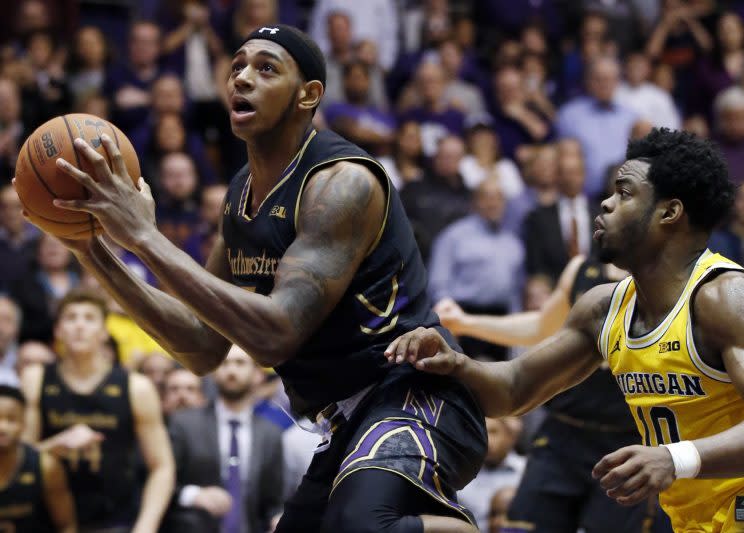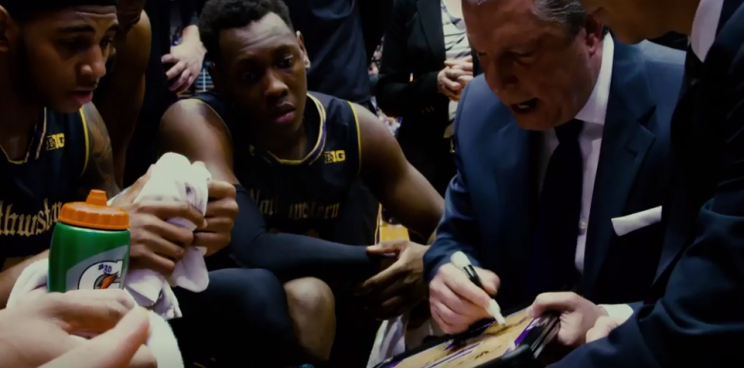Northwestern, The Play, the history behind it, and the night the rock split in two

EVANSTON, Ill. — On the night that it happened, after The Play, after the chaos, after the purple crush, after the dog pile at center court, and after the realization that Northwestern — his Northwestern — had surely clinched a spot in its first ever NCAA tournament, tears wanted to flow, but Chris Collins wouldn’t let them.
Thirty minutes earlier, he had watched the greatest play in Northwestern basketball history, and had no idea what to do. “I kind of felt like I was Jimmy V back in ’83,” he said. But as his mind finally drifted, back to the long nights in his office before he ever coached a game here, back to the struggles and the triumphs of the past four years, and back to all the emotions that accompanied them, his voice trailed off into a high-pitched whimper. He eked out a few words: “It’s been a great journey so far.” Those were all he could muster.
The story of Wednesday night in Evanston, the story of The Play, the story of the moment that will end 78 years of agony and misery can be told in a lot of ways. The best way to tell it is through tears. And a stare. And a silly little motto that only means anything to the two dozen or so people that had to believe in it.
***
On a brisk Thursday morning in October 2014, Chris Collins was getting weary. It was year two for him in Evanston, and after hours of talking at Big Ten media day, sighs began to precede his responses.
Then suddenly he leaned forward. His eyes got wider. “Look,” he said, and I did, right into those eyes. He stared back into my mine. “In all of our minds, we’re going to get it done. There is no ‘if.’ We’re going to get it done.”
“It” didn’t need subtext. It didn’t need an explanation. But it, for so many, was difficult to envision. Collins was convinced he could make history. Others didn’t necessarily doubt him, but after a 14-19 first season, history seemed a long way off.
Collins, though, believed.
“Now, when that’s going to happen, I’m not going to say it’s this year, or next year,” he said. “We’re making steps. But we’re going to get there.”
***
Tears. A lot of them. On a cold January night in Ann Arbor two years ago, they came, and neither Collins nor Bryant McIntosh could fight them off. McIntosh fell into the arms of family members, devastated. An hour earlier, the freshman point guard caught the ball on the left wing, a maize and blue sea parted, and McIntosh had the freedom of Crisler Center to send Northwestern’s game against heavily favored Michigan to overtime.
He drove.
He missed.
He cried.
So did Collins. “My guys keep getting their hearts ripped out,” he lamented, choking on the sobs.
Northwestern, in 2015, couldn’t stop losing close games. It lost 10 in a row. Doubts surfaced.
But as his eyes welled at Michigan that night, just as they would well 26 months later after a game against those same Wolverines, Collins maintained perspective. “To have Vic Law, Scottie Lindsey and Bryant McIntosh in these environments right now as true freshmen, that’s invaluable,” he said. “We’re going to look back on this when they’re juniors and seniors, and we’re winning big, and we’re going to talk about games like this as being part of our process.”
***
“When nothing seems to help, I go and look at a stonecutter hammering away at his rock, perhaps a hundred times without as much as a crack showing in it. Yet at the hundred and first blow, it will split in two, and I know it was not that blow that did it, but all that had gone before.”
That’s the motto. Pound the rock. It’s actually a quote, attributed to a Danish-American social reformer and journalist who died in 1914 named Jacob Riis. It’s plastered on a wall inside Welsh-Ryan Arena that players walk by every day.
To many, especially cynics, it’s a cute mantra-turned-branding slogan. To Collins, his coaching staff and his players, it’s so much more.
During that 10-game losing streak in 2015, it meant more to the program than ever before. It meant a lot after a five-game losing streak last year. It meant a lot after a third-straight postseasonless year. The harder it got to keep taking swings at the rock, the more relevant and necessary the motto became.
It was relevant and necessary as recently as this past week, when Northwestern, who two weeks earlier had seemed to be on the precipice of history, suffered its fifth loss in seven games in heartbreaking fashion at Indiana and slipped dangerously close to the bubble.
And it was as relevant as ever Wednesday evening.
***
Tears. Again. This time Northwestern assistant coach Brian James was on the verge of them.
James has been coaching basketball for nearly 40 years, early in his career at Glenbrook North High School, where he tutored a teenage Chris Collins, then as an assistant for five different NBA teams, most recently the Philadelphia 76ers. With Doug Collins, Chris’ father, on the way out in Philly in 2013, James joined Chris, his former player, at Northwestern.
Four years later, and moments before his 127th game on Northwestern’s sideline, tears started to fill James’ eyes, and a thought filled his head.
“Tonight, we’re not going to pound the rock. We’re going to break the rock.”
***

Two hours later, James had a clipboard in his hands, 1.7 seconds to work with, and a chance at redemption.
Four days earlier, he had been kicking himself. Northwestern had the ball in a similar situation, down one, on the baseline 94 feet from its basket with two seconds on the clock at Assembly Hall. James had three or four plays in his back pocket for this very situation. He chose one. It was ultimately unsuccessful, and immediately he second-guessed himself: “If God ever gives me another chance to rectify that…” he thought, as the idea of the loss to Indiana keeping Northwestern out of the NCAA tournament gnawed at his mind.
Four days later, four days after he had chosen wrong, James’ prayer was answered. A second opportunity arose. He put marker to board, and drew up the play he knew he should’ve gone to in Bloomington.
But, ironically, if it had been his choice, he wouldn’t have had the clipboard at all. With Northwestern and Michigan tied, and with so little time remaining, James didn’t want to risk a turnover. Collins and assistant coach Armon Gates overruled him.
“My instincts,” Collins explained, “said, No, we gotta go for it.”
So James, an out-of-bounds play specialist, grabbed the board and went to work. He figured Michigan would double-team McIntosh, so he told Dererk Pardon to set cross screens for McIntosh and Lindsey, then to leak toward the rim. He told Nathan Taphorn that he absolutely could not airmail the baseball pass, for if it went out of bounds untouched, Michigan would get the ball back where the pass came from.
“We draw a lot of plays up for McIntosh,” James said. “And I just had a funny inkling that they would go small, they’d put the big guy on the ball, like Thomas Bryant was at Indiana last weekend, and so I had my fingers crossed, and hoped Taphorn would throw it high enough.”
“We didn’t even have a name,” Collins said of the play. “Never even practiced it.” Pardon confirmed: “We have never practiced that.”
But wait. They’re wrong.
***
Three hundred and fifty-six days ago, there were tears. From Collins. From outgoing seniors Alex Olah and Tre Demps. From plenty of Wildcats whose seasons had just ended with a first round Big Ten tournament loss to — you guessed it — Michigan.
Three hundred and fifty-six days ago, there was also the first attempt at The Play. Or at least a similar attempt.
Northwestern trailed the Wolverines by two with 3.3 seconds remaining. Taphorn shuffled left across the baseline, came back to his right, and heaved a full-court pass in the direction of Demps. Michigan’s Zak Irvin got a hand on it. Northwestern’s season was over. The Play, in its first incarnation, hadn’t worked.
***
The reason Pardon never remembered practicing it is that the second time James drew it up, Pardon wasn’t on the end of the pass. Gavin Skelly was, and he won an intersquad scrimmage at the buzzer.
Pardon was the obvious choice this time around. He was a football player growing up, the best receiver on his seventh-grade team, according to his father, until his height led him off the gridiron and to the court. But coming out of the timeout, with most players having no previous knowledge of James’ scheme, the implementation was somewhat shoddy.
Then Northwestern got a break: Michigan saw the Wildcats’ set, and called timeout.
“We got another timeout to explain what we really wanted to do,” Collins said.
Rather than going to a different play to counteract Michigan’s adjustments, Collins told James to stick to the initial plot.
“We re-drew the play, and kind of had a set feeling on that one,” Taphorn said. “We all knew what we were going for.”
So the five players trotted back out to the court, back to their same spots. Pardon got behind the defense. Taphorn let fly. And Chris Collins became overwhelmed by fear. He thought Taphorn had done the one thing he absolutely could not do. He thought he had sailed it.
Oh, no, not tonight, Collins said to himself.
It wasn’t the first time Taphorn had had the ball in his hands in this situation, and it wouldn’t have been the first time he made a critical mistake. On Nov. 21 in Brooklyn, with Northwestern leading Notre Dame by one and 20 seconds to play, Taphorn had thrown away an inbounds pass and gifted the game to the Fighting Irish.
“That goes through my mind just about every day,” he said. “That will always resonate with me.”
But Wednesday, he delivered a new memory to override the old.
Perfect pass from @NU_nate32.#BTNStandout finish from @dererk5.
Monster win by @NUMensBball: https://t.co/oTN8CG8VIl
— Big Ten Network (@BigTenNetwork) March 2, 2017
“When I saw the ball out of Nate’s hands, I thought it was long, I thought it was going out of bounds at first,” Pardon said. “But as I caught it, I’m like — The rim is right there!” He smiled.
And then he ran, aimlessly, until he was corralled by Lindsey. Law and Taphorn dragged him to the ground. Students streamed onto the court in glee, turning the far-side bleachers into what looked like a human landslide, and turning the court into a sea of purple.
Later, while players poured an entire water cooler over Collins’ head in the locker room, some students lingered, trying to grasp the moment, reluctant to let it slip away. A few probably understood the gravity of it. Many probably didn’t. Many weren’t aware of the tears, weren’t aware of the days, weeks, months and years of pounding.
Many probably couldn’t fully comprehend what had just happened.
“It” had happened. The rock had split in two.



